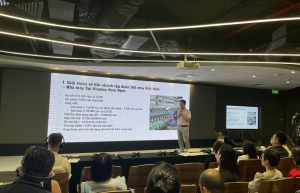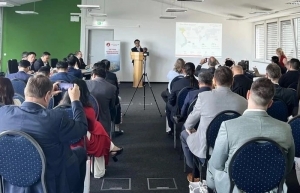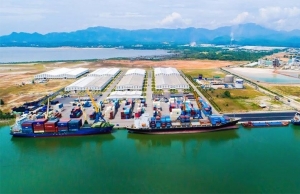Opportunities widen to do business in Germany
The World Heritage Foundation’s recent Economic Freedom Report 2024 ranked Vietnam as a “moderately free country”, placing 59th out of 179 countries. At first glance, this ranking seems to be nothing noteworthy, especially when compared to economically prosperous countries such as the US, which is ranked 25th, albeit with a downward trend compared to previous years.
 |
| Prof. Dr. Andreas Stoffers, economist, FOM University (left) and Le Ai Ngan Business immigration expert |
Since the report was launched 30 years ago, no other country of comparable size (except Poland) has shown higher growth than Vietnam, which has moved up 12 places in the last year alone.
In 2024, Vietnam’s economic policy is characterised by a clear commitment to free trade, a balanced, manageable state budget-debt ratio of around 34 per cent, a public spending ratio to GDP of about 21 per cent, an investor-friendly economic climate and policies aimed at achieving a balance between various political and economic partners, which is particularly important in times of newly emerging geopolitical conflicts.
Today, the country is one of the most dynamic economies in the world, offering investors from around the globe attractive conditions. That is one reason why the economic climate in Vietnam is marked by great optimism. The time is there for a great leap forward.
Germany is a successful and industrialised country and on the way to climate neutrality. The German government wants to create new prospects and promote innovation. It is working hard to ensure that “Made in Germany” remains a model for success in the future.
There are many reasons to be confident. The federal government is doing everything possible to ensure that Germany remains an attractive business location that can impress the world with its innovations. Many of the industrial goods manufactured in Germany are cutting-edge technology, for example in mechanical engineering, semiconductor technology, and the pharmaceutical industry. German industry has shown that it can develop climate protection solutions for global use and reduce its own greenhouse gas emissions.
With well-known companies as well as small- and medium-sized enterprises as the country’s backbone, Germany offers excellent prospects for business relationships. Added to this is Germany’s strong integration into the European Union, which accounted for 14.17 per cent of global GDP in 2024. A foreign company’s economic entry into Germany is always also an entry into the EU.
More than 400 German companies are in Vietnam. Vietnamese products can be found more on the shelves of German supermarkets and other retail outlets. The EU-Vietnam Free Trade Agreement has opened up European markets to Vietnamese businessmen and their ambition.
Relations between the two countries can also be described as extremely good. In 2025, the two countries will celebrate the 50th anniversary of the establishment of diplomatic relations. The more than 200,000 overseas Vietnamese who have found a home in Germany provide an important bridgehead for Vietnamese companies. And there are also many Vietnamese in Vietnam who have either lived in Germany for a long time and trained or studied there, as well as Vietnamese who can speak German.
All in all, there are good opportunities to expand relations between the two countries in both directions. Some Vietnamese companies have already made their entry into Germany. One example is VinFast, which is putting significant effort into selling its vehicles in Germany and the EU. As VinFast focuses on electric vehicles, the company directly meets the consumer demand in Germany.
A second large Vietnamese corporate worth mentioning is VietinBank, which has had branches in Berlin and Frankfurt for many years. In any case, companies that are either owned by Vietnamese or Germans of Vietnamese origin – such as the Dong Xuan Centre in Berlin. More importantly, there is now a lively startup scene, especially in Berlin, which also has a Vietnamese flavour.
Meanwhile, Vietnamese entrepreneurs can establish and expand their businesses in Germany by applying for a self-employment visa. This visa can be granted for up to three years, with options for extension or conversion to a permanent residence permit. After five years of residence, Vietnamese entrepreneurs and their families can apply for German citizenship and therefore obtain dual citizenship. Germany offers free education, and naturalised Vietnamese citizens can take full advantage of Germany’s robust educational system.
To qualify for a self-employment visa, entrepreneurs should already have a successful business in Vietnam and meet the following three criteria: there must be an economic interest or regional need for their business in Germany, the business activity should positively impact the German economy, and the venture must be secured by equity or a loan commitment.
Given these stringent criteria, it is essential for applicants to have a robust business track record in Vietnam. This prior success indicates their capability to replicate or adapt their business model to the German market, ensuring they can navigate and thrive in a new economic environment. The expectation is that their proven entrepreneurial skills will enable them to establish and run a successful business in Germany, thus justifying their residence under the self-employment visa.
In essence, the self-employment visa under section 21 of the Residence Act is designed for those who are already accomplished in their entrepreneurial endeavours in Vietnam. This ensures that only those with the potential to make an economic contribution to Germany are granted the opportunity to do so.
 | Germany supports green technology pilot for Vietnamese businesses Green technology pilot for Vietnamese textile and garment exporters were showcased at the Demo Day in Hanoi on June 17 as part of the German government’s initiative to support Vietnamese businesses in their green transition. |
 | Binh Dinh seeks investment opportunities from Germany, France A delegation from the south central province of Binh Dinh led by Permanent Vice Secretary of the provincial Party Committee Le Kim Toan paid a working trip to Germany and France to explore investment opportunities from July 17-22, reported the provincial Department of Planning and Investment. |
 | German players leading wave of Euro investments European companies including German ones continue to venture into Vietnam as part of their efforts to diversify supply chain and strengthen manufacturing base in Asia. |
 | Germany's DIGI-TEXX launches new operations centre in Hau Giang DIGI-TEXX Vietnam has launched its new operations centre in Hau Giang province, contributing to the economic transformation of the Mekong Delta region. |
 | Germany backs Vietnam in energy grid development In July, the government issued a ruling on direct power purchase agreements (DPPAs). Dr. Oliver Massmann, partner and general director of consulting firm Duane Morris Vietnam LLC, spoke with VIR’s Khoi Nguyen about how the move will impact the energy sector in Vietnam, especially when it comes to German investors. |
What the stars mean:
★ Poor ★ ★ Promising ★★★ Good ★★★★ Very good ★★★★★ Exceptional
Related Contents
Latest News
More News
- SK Innovation-led consortium wins $2.3 billion LNG project in Nghe An (February 25, 2026 | 07:56)
- THACO opens $70 million manufacturing complex in Danang (February 25, 2026 | 07:54)
- Phu Quoc International Airport expansion approved to meet rising demand (February 24, 2026 | 10:00)
- Bac Giang International Logistics Centre faces land clearance barrier (February 24, 2026 | 08:00)
- Bright prospects abound in European investment (February 19, 2026 | 20:27)
- Internal strengths attest to commitment to progress (February 19, 2026 | 20:13)
- Vietnam, New Zealand seek level-up in ties (February 19, 2026 | 18:06)
- Untapped potential in relations with Indonesia (February 19, 2026 | 17:56)
- German strengths match Vietnamese aspirations (February 19, 2026 | 17:40)
- Kim Long Motor and AOJ Suzhou enter strategic partnership (February 16, 2026 | 13:27)

 Tag:
Tag:




















 Mobile Version
Mobile Version